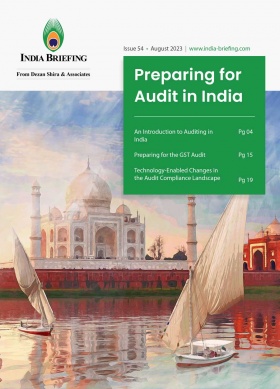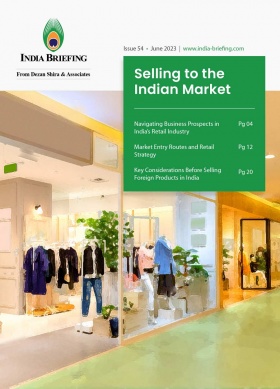Foreign Investment Climate in Gujarat
The foreign investment climate in Gujarat benefits from its strategic location on India’s west coast and enabling policies and infrastructure.
Gujarat is a manufacturing powerhouse across diverse sectors, including automotive and auto components, chemicals and petrochemicals, drugs and pharmaceuticals, cement, textiles, engineering, gems and jewelry, and ceramics.
According to the Department for Promotion of Industry and Internal Trade (DPIIT), Gujarat received a significant foreign direct investment (FDI) inflow of US$3.2 billion in the April-June 2022 period and recorded a whopping US$30.38 billion between October 2019 and June 2022.
FDI inflows into Gujarat during the first three quarters of FY 2022-23 more than doubled to INR 323.49 billion (approx. US$3.94 billion) compared to INR 153.21 billion (approx. US$1.866 billion) in the corresponding quarters of the previous fiscal.
Further, an MSME Export Promotion Council study showed that the Gujarat private sector planned projects worth INR 466.71 billion (approx. US$5.68 billion) between FY 2019 and FY 2022, and the state received INR 201.71 billion (approx. US$2.45 billion) in FDI during this period.
These impressive figures can be attributed to the Gujarat government, which has launched more than 20 sector-specific policies to enhance industrial capacity, build supply chains, and promote research and development (R&D).
Over 300 Fortune 500 companies call Gujarat their home, with five state-run enterprises – GSPL, GSFC, GNFC, GACL, and GMDC – featured among them. This showcases the Gujarat government’s competence in corporate governance and its ability to generate high returns on capital, which is evident in its support for industry and infrastructure development.
Key state infrastructure
Gujarat possesses world-class infrastructure, including a vast network of connectivity and utilities that extend to the last mile. Some of the features of Gujarat’s infrastructure that make it an attractive location for foreign investment are:
- A total of 157,470 km (97,847 miles) of roads, which includes national highways, state highways, and district roads.
- As a power-surplus state, Gujarat can provide round-the-clock, three-phase, uninterrupted, high-quality power with more than 30 GW of installed power generation capacity, ensuring 24×7 uninterrupted supply.
- A total of 49 ports, including 1 major port and 48 non-major ports.
- 17 operational airports and airstrips, including 2 international airports.
- 2600 km state-wide Integrated Gas Grid.
- Several mega infrastructure projects around notified investment regions.
Handholding for foreign investors
The Gujarat Single Window Clearance Act 2017 was passed by the Government of Gujarat to simplify doing business in the state. The Act’s primary objective is to accelerate the process of issuing licenses, clearances, and certificates necessary for establishing a business while fostering an investor-friendly environment in the state. This Act has improved transparency, enabled online applications, and strengthened the monitoring of applications via iNDEXTb and the IFP.
iNDEXTb
To expedite industrial development and promote socio-economic growth in the state, the Gujarat government established the Industrial Extension Bureau (iNDEXTb) as an investment promotion agency. iNDEXTb aims to facilitate, handhold, and address investor grievances while acting as a repository of information for potential investors. The Bureau provides proactive support to both new and existing investors and acts as an intermediary between investors and the government to establish industrial ventures. As a single point of contact, iNDEXTb serves as a centralized agency for investors seeking opportunities in Gujarat.
Investment Facilitation Agency (IFA)
The Investor Facilitation Agency (IFA) is a physical body established at the Gujarat state’s Industries Commissionerate office, with the following objectives:
- To guide and assist entrepreneurs in setting up industries in the state.
- To provide necessary assistance in policy formulation for industrial progress.
- To offer secretarial support to the State Level Facilitation Committee, Single Window Facilitation Committee, or District Level Facilitation Committee, as required.
- To collaborate with various State Government departments for investor applications, integrate websites with the Investor Facilitation Portal, and provide support for its smooth functioning.
- To address investor grievances concerning approvals, incentives, land-related issues, technical issues, and other matters in accordance with prescribed procedures.
Investor Facilitation Portal
The Investor Facilitation Portal (IFP), managed by the IFA, is an online platform that serves as the primary point of contact for potential investors in the state. It provides a single window for all necessary services, including online form filling, payments, and downloading certificates and licenses. The IFP also features a grievance redressal mechanism.
All the applications across various departments are available online on the IFP portal. These include:
- Pre-requisite clearances (Land allotment, NA Permission, Registration of Partnership firm and Registration of Co-operative Societies)
- Pre-establishment approvals
- Renewals
- Incentives
Where to locate your investment
Gujarat offers investors an advanced industrial ecosystem, investment hubs like industrial corridors and special economic zones, and sophisticated port infrastructure.
In the following sections, we spotlight key initiatives for business promotion and industrial activity in the state. Foreign entities must gauge their relevance to the enterprise business strategy, and in the context of overall support provided and operation costs.
Mega infrastructure projects to connect investment-friendly zones
The government of Gujarat has planned for several mega infrastructure projects connecting and upgrading areas that have been notified as major investment regions.
Below is a quick profile of some of the mega projects.
Delhi-Mumbai Industrial Corridor (DMIC): Among the largest infrastructure projects in the world, the DMIC, is a high-tech industrial zone planned across six states and covering the 1,500 km long Western Dedicated Freight Corridor (DFC). The project has an estimated investment of US$90 billion (around INR 6.4 trillion) by the Government of India, with approximately 36 percent of the corridor passing through Gujarat. Additionally, the state is home to six of the 24 industrial nodes identified across the DMIC, including the Ahmedabad-Dholera Investment Region, Vadodara-Ankleshwar Industrial Area, Palanpur-Mehsana Industrial Area, Bharuch-Dahej PCPIR and Investment Region, Surat-Hazira Industrial Area, and Valsad-Umbergaon Industrial Area. The DMIC & DFC influence zone will witness development of greenfield ports, augmentation of existing industrial estates, establishment of sector-specific manufacturing and services hubs, and investment in power projects.
Dholera Special Investment Region (D-SIR): D-SIR is India’s largest greenfield industrial investment region, spanning over 920 sq. km. It will have smart and sustainable infrastructure, including transportation, water, power, wastewater, drainage, and urban design. The focus sectors in D-SIR include heavy engineering, automobiles and auto ancillary, defense, electronics, hi-tech technologies, agri and food processing, and infrastructure. The region will also feature the world’s largest solar park of 5 GW. D-SIR will be connected to Ahmedabad by a six-lane access-controlled expressway and Metro Rail Transit System (MRTS) in one common corridor, providing seamless connectivity. An international airport is being developed at Dholera SIR for swift international and domestic connectivity.
Mandal Becharaji Special Investment Region (MBSIR): MBSIR is emerging as the world’s largest auto-hub and a hotbed for Japanese automobile and auto component manufacturing industries. Companies like Suzuki Motor Corp., Honda Motorcycles, Scooter India Pvt. Ltd, and Toyota Tsusho India have already established their units in the region. Located around 90 km from Ahmedabad, MBSIR is well connected to leading ports, airports, railroads, and National Highway (NH) roads.
Mumbai-Ahmedabad High-Speed Rail: India’s first high-speed rail project connecting two mega-cities – Ahmedabad and Mumbai – is being developed with an investment of over INR 800 billion (~US$11.23 billion) in association with Japan International Cooperation Agency (JICA).
Petroleum, Chemicals, and Petrochemicals Investment Region (PCPIR): Located at Dahej, South Gujarat, PCPIR is India’s first specially delineated investment region of 453 sq. km. for manufacturing of petroleum products, chemicals, and petrochemicals. Better regional connectivity through the DFC, DMIC, and the expressway connecting Baroda to Mumbai, will boost prospects for investors at the PCPIR. Further, three new LNG terminals and a greenfield airport have also been planned in/around the PCPIR.
Gujarat International Financial Tech (GIFT) City: GIFT City is India’s 1st operational smart city and International Financial Service Centre (IFSC), with world-class infrastructure for offshore and international transactions in banking, insurance, and capital markets. It is a vertical city with integrated development on 886 acres of land, with 62 million sq. ft. (5.5 million sq. mts.) of built-up area. GIFT City is also home to India’s first international exchange – India INX. The GIFT City has already attracted several international financial institutions.
Diamond Research and Mercantile (DREAM) City: It is a smart city under development near Surat, known as the diamond capital of India. The city aims to boost diamond trading from Gujarat and is estimated to cost INR 240 billion (around US$350 million). Spread over 2,000 acres, DREAM City will feature an International Diamond Trading Hub and a Diamond Bourse.
Setting up in a notified investment region in Gujarat allows the enterprise to access the following:
- Take advantage of a business-friendly environment, whether it contains established infrastructure or is a greenfield investment area.
- Access to skilled human resources and incentives for hiring from within the state.
- Abundance of natural resources to make production inputs cost competitive.
- Large consumer market.
- Easy connectivity by road, air, rail, and sea to reduce logistics costs.
- Presence of micro, small, and medium-sized enterprises (MSMEs) to enable building a network of local supply chains.
- Existing social infrastructure to create a positive environment for labor and factory sites.
- Urban development to ensure higher quality of life.
Industrial parks
Integrated industrial parks in Gujarat are self-contained islands that provide high-quality infrastructural facilities, offering developed plots and pre-built factories for industrial, residential, and commercial areas, as well as power, telecom, water, and other essential social infrastructure.
The following infrastructure facilities are developed in industrial parks:
- Developed land/plot
- Water distribution
- Sewerage collection and treatment
- Internal roads
- Electricity
- Communication network
- Effluent treatment and disposal facilities for treated effluents
- Any other service required
Private industrial parks cater to all of Gujarat’s prime industries – chemicals and petrochemicals, textiles and garments, engineering and auto, pharmaceuticals and biotechnology, IT and electronics, mines and minerals, and gems and jewelry.
Industrial estates
The Gujarat Infrastructure Development Board oversees 202 industrial estates. The details of the land acquired, developed, and allotted in various districts / estates of the state is available online.
Major industrial estates in Gujarat are in the following areas: Vapi, Panoli, Ankleshwar, Dahej, Jhagadia, Vilayat, Sachin, Pandesara, Naroda, Vatwa, PCC, Halol, Makarpura, Savli, Gandhinagar, Vaghodia, Porbandar, V.U. Nagar, Umbergaon, Lodhika, and Jamnagar-II.
Special economic zones in Gujarat
Gujarat is home to numerous special economic zones (SEZs) located in major cities. These SEZs are designed as specific enclaves with relaxed duties and fiscal incentives to promote the export of goods and services, expand economic activity, and facilitate increased investments. SEZs benefit from a streamlined clearance process and self-certification-based compliance procedures.
Exports and industry-specific special economic zones
With a contribution of over 20 percent to India’s net export share, Gujarat has begun setting up industry-specific SEZs that will encourage export-oriented manufacturing in key industries, including pharmaceuticals, chemicals, jewelry, gems, and ceramics.
Case Study: Manufacturing Feasibility Study
A client specializing in electronic component manufacturing considered moving its manufacturing operations from China to India for cost reduction, risk mitigation, and diversification. The client (Company) shortlisted several states in India, including Gujarat, Maharashtra, Tamil Nadu, Uttar Pradesh, and Karnataka. Dezan Shira & Associates provided consultancy services for this project.
Approach
Dezan Shira & Associates (DSA) worked closely with the the Company to identify and review key aspects of shortlisted states in India, including political climate, economic environment, regulations and environment standards, cities/districts for manufacturing, general operating costs, labor review, logistics quality, tax and tariff review, and incentives policies.
DSA conducted research by leveraging its database and requesting information from industrial zones, investors, state investment promotion agencies, and in-house legal and tax experts to provide a holistic picture of each potential state.
Standardizing data and information on the states of interest were key challenges that DSA faced during the study.
Result
Manufacturing Feasibility Report that recommended top state(s) that were optimal for the Company’s operations.
About Us
India Briefing is produced by Dezan Shira & Associates. The firm assists foreign investors throughout Asia from offices across the world, including in Delhi and Mumbai. Readers may write to india@dezshira.com for more support on doing business in India.
We also maintain offices or have alliance partners assisting foreign investors in Indonesia, Singapore, Vietnam, Philippines, Malaysia, Thailand, Italy, Germany, and the United States, in addition to practices in Bangladesh and Russia.
- Previous Article India’s Q1 FY24 GDP Growth Reaches 7.8%, Outpaces Major Economies
- Next Article India’s LLP Amnesty Scheme 2023: September 1 to November 30
















